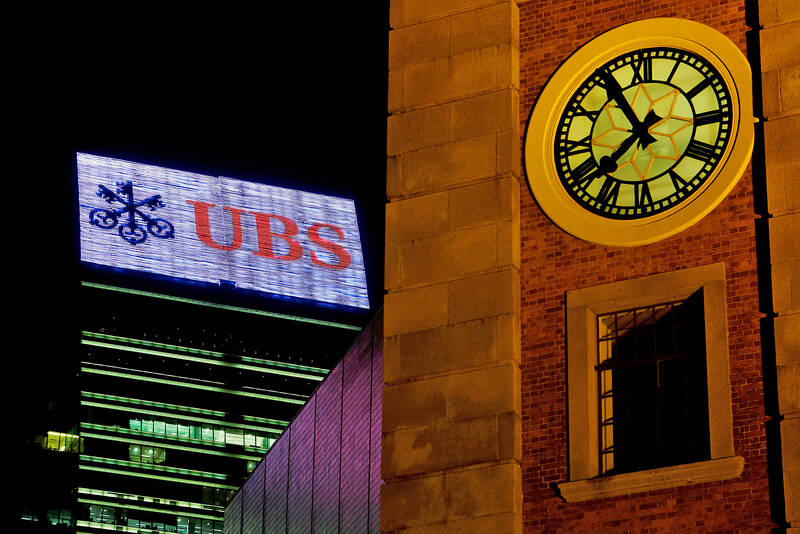UBS Group AG is letting go of half a dozen mainland China-focused employees in Hong Kong, as turmoil in the world’s second-largest economy hammers dealmaking, prompting global banks to rein in their presence in the once lucrative market.
The Swiss bank has trimmed bankers in businesses including debt capital markets, investment banking and real estate, the people said, asking not to be named discussing private information. A UBS spokesman declined to comment.
Investment banking revenue for UBS in China has plunged by about half, although gains in Japan and Australia helped prop up its overall Asia business, people familiar said.

Photo: Reuters
New issuance in debt and equity markets has slowed this year following sweeping policy changes in China and slowing economic growth, denting revenue at banks that had ambitious expansion plans for the country.
Rival Credit Suisse Group AG, saddled by major losses, is also preparing large cuts to its investment banking unit and is questioning its long-term plans for China amid slowing growth and geopolitical tension.
Global investment banking revenue at UBS tumbled 57 percent in the second quarter during what chief executive officer Ralph Hamers said was one of the most difficult periods for investors in a decade.
In Asia, UBS has been focused on the sale of Chinese junk bonds to wealthy clients, a business that has almost evaporated as Chinese property developers remain largely shut out of the market amid a deepening property crisis.
Investment banks had been going full steam into China as Beijing opened the door to full ownership of their ventures in the country, counting on reaping billions in profits. UBS boosted its stake in its China securities venture to 67 percent in March after its mainland China revenue had more than doubled to almost US$1 billion last year from 2019.
Now they are facing rougher markets. Offshore bond sales by Chinese firms have slid 44 percent this year to US$63.9 billion, data compiled by Bloomberg showed.
Defaults by property firms including giants in the offshore market such as China Evergrande Group (恆大集團) and Kaisa Group Holdings Ltd (佳兆業集團) have dented investor appetite.
UBS has plunged in the league tables of dealmakers in China offshore bonds, falling 24 places to rank 42nd. The Swiss bank is ranked 45th for Asia high-yield bonds denominated in US dollars, euro and yen, slumping 38 places so far this year, the data showed.
The job cuts at UBS also come as China steps up scrutiny of companies seeking to sell debt abroad as defaults worsen to record levels.
Borrowers, including financial firms, need approval from the Chinese National Development and Reform Commission for issuance of debt with maturities longer than one year, a draft for comments revealed on Friday last week showed. The consultation period runs until Sept. 26.

In Italy’s storied gold-making hubs, jewelers are reworking their designs to trim gold content as they race to blunt the effect of record prices and appeal to shoppers watching their budgets. Gold prices hit a record high on Thursday, surging near US$5,600 an ounce, more than double a year ago as geopolitical concerns and jitters over trade pushed investors toward the safe-haven asset. The rally is putting undue pressure on small artisans as they face mounting demands from customers, including international brands, to produce cheaper items, from signature pieces to wedding rings, according to interviews with four independent jewelers in Italy’s main

Macronix International Co (旺宏), the world’s biggest NOR flash memory supplier, yesterday said it would spend NT$22 billion (US$699.1 million) on capacity expansion this year to increase its production of mid-to-low-density memory chips as the world’s major memorychip suppliers are phasing out the market. The company said its planned capital expenditures are about 11 times higher than the NT$1.8 billion it spent on new facilities and equipment last year. A majority of this year’s outlay would be allocated to step up capacity of multi-level cell (MLC) NAND flash memory chips, which are used in embedded multimedia cards (eMMC), a managed

Japanese Prime Minister Sanae Takaichi has talked up the benefits of a weaker yen in a campaign speech, adopting a tone at odds with her finance ministry, which has refused to rule out any options to counter excessive foreign exchange volatility. Takaichi later softened her stance, saying she did not have a preference for the yen’s direction. “People say the weak yen is bad right now, but for export industries, it’s a major opportunity,” Takaichi said on Saturday at a rally for Liberal Democratic Party candidate Daishiro Yamagiwa in Kanagawa Prefecture ahead of a snap election on Sunday. “Whether it’s selling food or

In the wake of strong global demand for AI applications, Taiwan’s export-oriented economy accelerated with the composite index of economic indicators flashing the first “red” light in December for one year, indicating the economy is in booming mode, the National Development Council (NDC) said yesterday. Moreover, the index of leading indicators, which gauges the potential state of the economy over the next six months, also moved higher in December amid growing optimism over the outlook, the NDC said. In December, the index of economic indicators rose one point from a month earlier to 38, at the lower end of the “red” light.